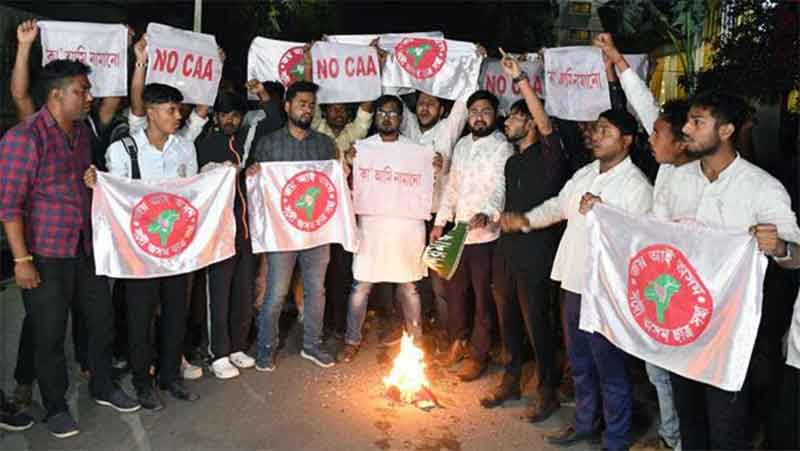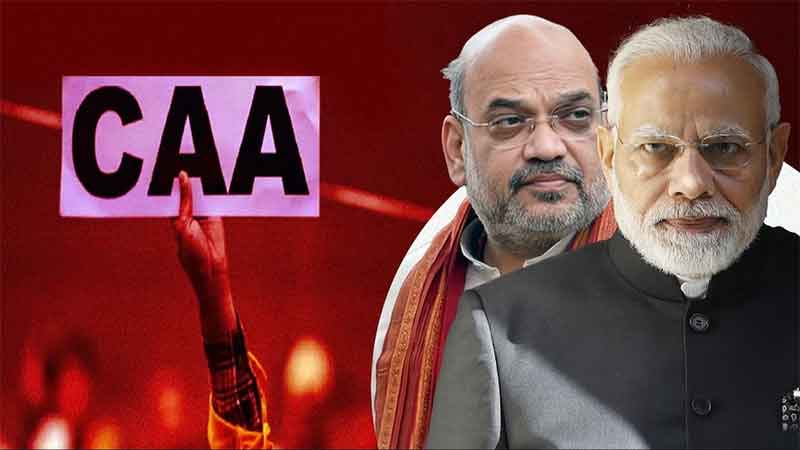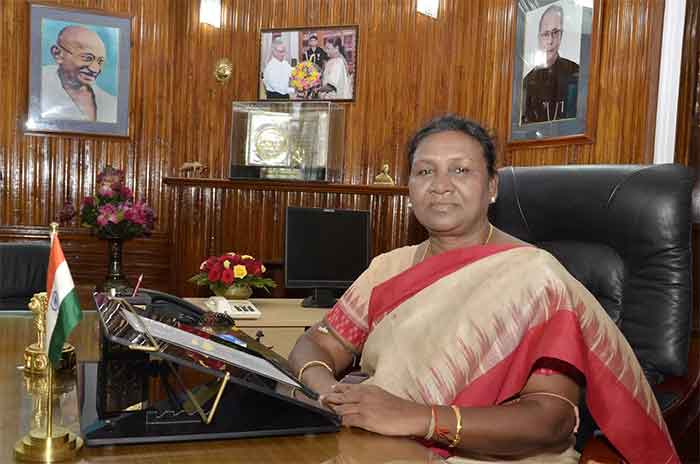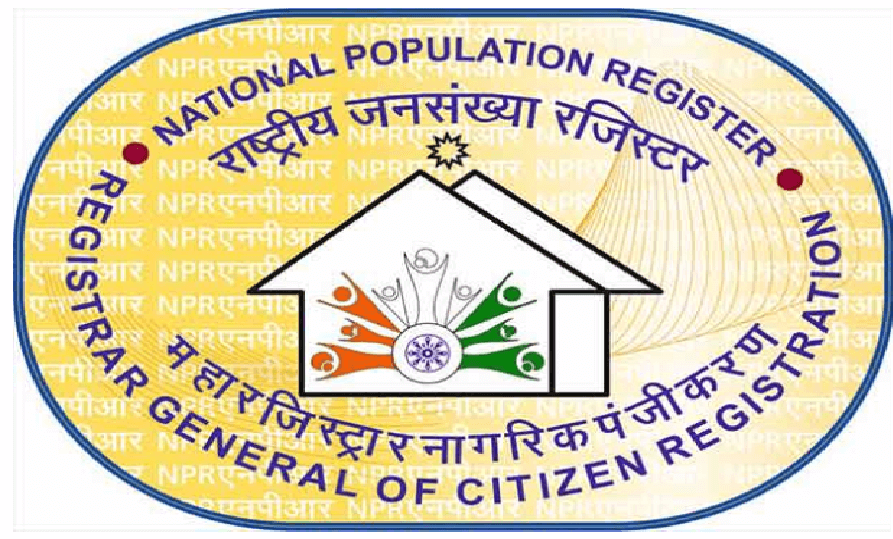
The mediadarbar.com published a story[1] to explain CAA and NRIC. the story goes like this:
A pilot reaches a village with a big aircraft and offers a free ride to its villagers. The villagers had never seen a plane like this, in such a proximity. So many fall prey to the pilot’s ploy and took the seat. The full plane, soars in air, flies higher and higher. Suddenly when everyone was enjoying the flight and were chatting loudly with excitement, the pilot comes out of the cockpit and asks the passengers to show their identity papers, land papers, LIC policies, PAN, AADHAR, Voter ID, educational certificates etc. to his people. The smart ones, had their papers with them. The affluent ones got them made from the pilot’s people on payment. When the papers reached pilot, he found that some from his own community were unable to produce the required papers and therefore pilot announced exemption for the people of his own community. Those left were poor, illiterate, having no land or educational documents. The pilot then distributes the parachutes to those who could produce documents or belonged to his community. Then comes the order from the pilot for everyone to jump from the plane. Pilot was not concerned that many of them will die.
Finally, all of them jump. Separated from each other, persons without parachutes died immediately. And those with parachute, due to air flow, land on the earth at distant places, making pilot’s plan of dividing the people on the basis of religion and tearing down the social-fabric a grand success.
Most of the readers, are able to identify Citizenship Amendment Act, 2019 (CAA) and National Register of Citizenship (NRC) in the above story and will agree with the end. But there is also National Population Register (NPR) in the heart of the above story that lies in collecting, scrutinizing and sorting out the documents.
For this we need to revisitCitizenship (Registration of Citizens and Issue of National Identity Cards) Rules, 2003[2] under the sub-sections (1) and (3) of section 18 of the Citizenship Act, 1955 . According to sub-rule(4) of rule 3: The Central Government may, by an order issued in this regard,decide a date by which the Population Register shall be prepared by collectinginformation relating to all persons who are usually residing within the jurisdiction of LocalRegistrar.According to a gazette notification issued of July31, 2019 by VivekJoshi, Registrar General of Citizen Registration and Census Commissioner, In pursuance of sub-rule(4) of rule 3 of the Citizenship (Registration of Citizens and Issue of National Identity Cards) Rules, 2003, the Central Government hereby decides to prepare and update the Population Register and the field work for house to house enumeration throughout the country except Assam for collection of information relating to all persons who are usually residing within the jurisdiction of Local Registrar shall be undertaken between the 1st day of April, 2020 to 30th September, 2020[3].
What is NPR?
The NPR is a register of usual residents of the country with the objective is to create a comprehensive identity database of every usual resident in the country. It is being prepared at the local(village/sub-town), sub-district, district, state and national level under provisions of the Citizenship Act 1955 and the Citizenship (Registration of Citizens and issue of National Identity Cards) Rules, 2003. It is mandatory for every usual resident of India to register in the NPR.The database would contain demographic as well as biometric particulars.The house to house enumerationincludes demographic and biometric details. Details such as name, age, sex, father & mother’s name and their date of birth (if dead), permanent residential address, relationship in household, nationality, educational qualifications, occupation, date of birth, marital status, birthplace and mother tongue along withAadhar details, driving licence, voter card and mobile number (if available) are soughtin order to prepare and update the population register.The National Register of Indian Citizens shall be divided into sub-parts consisting of the State Register of Indian Citizens, the District Register of Indian Citizens, the Sub-District Register of Indian Citizens and the Local Register of Indian Citizens. The register will then be verified and the biometric data will be collected from the UIDAI. Any individual whose citizenship is considered doubtful will be informed and will be asked to prove his citizenship.
The draft will then be published at the local level for inviting any objection or for inclusion of any name or correction. The Sub-district or TalukRegistrar will then consider such objections and summarily dispose off the same within a period of ninety days.The individual, who could satisfy the Sub-district/ Taluk registrar, their name will then be transferred in the Local Register of Indian Citizens prepared bythe District Registrar of Citizen Registration who will thentransfer them to the National Register of Indian Citizens (NRIC). The aggrieved person can appeal to the District Registrar of Citizen Registration. The decision of District Registrar is final, and for now, according to the 2003 Rules, there appears no further appeal can be entertained in Indian Court. Interestingly, a semi-judicial body is enshrined by the Rules to decide the Citizenship of an individual.
The MHA, towards the end of July this year, has called for setting up of one detention camp in the city or district where major check post is locatedwhile issuing the 11-page 2019 Model Detention Manual so that illegal migrantscan be housed there and located easily when deportation is legally ordered.Interestingly, along with other states, West Bengal government too is making two detention centres, one in Bangaon in North 24 Parganas district and the other in New Town near Kolkata.
NRP is not Census
NRP is not Census which is undertaken every ten years, beginning in 1872 under British Viceroy Lord Mayo. The first complete census was taken in 1881. All the Census since 1951 were conducted under the Census of India Act, 1948. The last census was held in 2011 and the 16th Census will be held in 2021, a notification in this respect is published in the Gazette on March 26, 2019. The collection of information in this regard will start from March1, 2021. The information collected during the process is confidential to the extent that it is not even accessible to the courts of law.According to Sec14 of Census Act 1948, the records of Census are not open to inspection nor are admissible in evidence.This huge information collected is then used to generate specific pre-formatted tables for use by a wide range of data users. About 300 tables are generated using the database of information on more than a billion people. Besides, on request from data users customized tables are also generated for their specific use from the database.
Whereas, on the other hand NPR is an open access register. From this NPR draft, as per the Rules of 2003, the draft of the Local Register of Indian Citizens shall be published by the Sub-district or Taluk Registrar, for inviting any objections or for inclusion of any name or corrections for the family or individual particulars collected and proposed to be finally entered in the National Register of Indian Citizens (rule6(a)). The Sub-district or Taluk Registrar will then consider such objections and summarily dispose off the same within a period of ninety days. Any person aggrieved by the order of the Sub-district or Taluk Registrar may prefer an appeal to the District Registrar of Citizen Registration who shall take a final decision, after giving an opportunity of being heard to the person so aggrieved.
Furthermore, Census data is presented in the form of statistics, where individuals can’t be identified. And NPR is raw data on individuals, leavingthem highly vulnerable.
NPR is the First Stage of NRIC
As is clear from the above, the NPR is a clever ploy of identification and registration of Indian Citizensunder the Citizenship (Registration of Citizens and Issue of National Identity Cards) Rules, 2003. That it is the first step towards creation of NRC is admitted by the ORGI[4]. And for this purpose only, the objections are sought for those whose citizenship is considered doubtful. The notice for fieldwork to prepare and update the Population Register by house to house enumeration is already published. The training for which in different states is going on. Even in the state of West Bengal, where now along the Kerala the NPR work is suspended, two six-days training workshops of DMs and ADMs were conducted in Administrative Training Institute in Kolkata. Till the end of the first week of December, 2019, the Chief Minister of West Bengal issued advertisement in various print and TVs misinforming people that NPR is Census and there is no reason to be apprehensive or being anxious and reassuring them that her government will not allow NRC exercise. It is rather unbelievable the CM of WB was issuing these advisories in innocence. Thoughthe enumerative work for both NPR and Censusisbeing done by the same Office of Registrar General& Census Commissioner of India, the notices for both are issued separately and that even the year of initiatingthe enumerations too is different and arebeing done under the provision of different Acts. NPR is done under the Citizenship Act 1955 and Census is carried out as per The Census Act 1948.Therefore, the stay-notice of December16,2019 issued by the Additional Secretary of WB government on preparation/updation of NPR, questions the motive and credibility of Mamata Government. While, writing once again WB government has taken a U-turn by saying that the said stay is not permanent, but the NPR activities are being withheld for the time being, considering the law and order situation.
One must remember, that it is not for the first time that the national government is preparing NPR. On the basis of data collected during the first phase of 2011 Census the first NPR was prepared under the UPA regime. There was a conflict between the Union Home Ministry, which administered NPR and UIDAI. As the both involved gathering personal details including the biometric data. It was then decided that both will use each other’s biometric details and data captured for NPR will be shared by UIDAI for de-duplication. The present government in its first tenure updated NPR data in 2015. The existing activity on NPR that is going to begin on 1st April next year is a continuation of the earlier activities on NPR.
LASTLY, though the government is yet to notify a date for generation of NRC, it will be difficult to stop them from forming the register of Indian Citizens, once the NPR is updated. Because the only work left will be to identify doubtful citizens from the updated NPR and issue a notice for claims and objection. Once the ball is rolled for NPR, it is just a matter of time for the country to fall in a situation like Assam, where each and every resident’s main concern for last 4 years is to collect documents, prove their citizenships in numerous hearings and courts to get enlisted name in the final draft of NRC.Though it is not known what documents are admissible, it is being repeatedly informed by various officials that Aadhar, Voter Card or Passport are not citizenship documents[5]. Before the things go out of the hands, it is the moment to decide whether we are ready to pay this huge cost like Assam, where people have spent all the resources available to them both economic and social and are still not in peace.
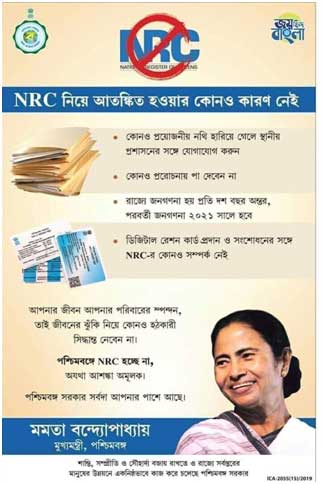
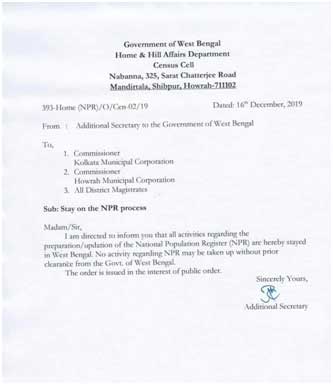
[1]http://mediadarbar.com/32761/what-is-caa-and-nrc-learn-through-this-story/
[2]http://www.censusindia.gov.in/2011-Act&Rules/notifications/citizenship_rules2003.pdf
[3]http://egazette.nic.in/WriteReadData/2019/209680.pdf
[4]http://censusindia.gov.in/2011-Common/FAQs.html
[5]https://www.newindianexpress.com/nation/2019/dec/21/aadhaar-voter-id-card-passport-not-proof-of-citizenship-government-officials-2079070.html
Nisha Biswas is an activist
SIGN UP FOR COUNTERCURRENTS DAILY NEWS LETTER


